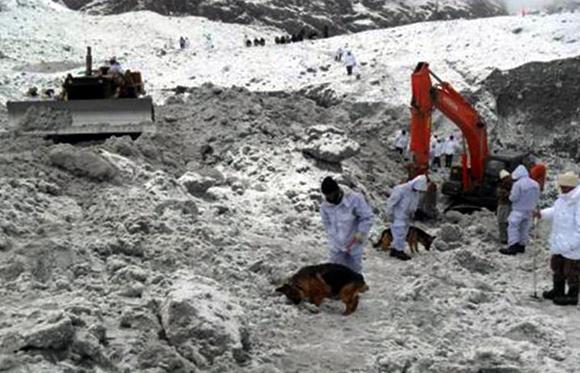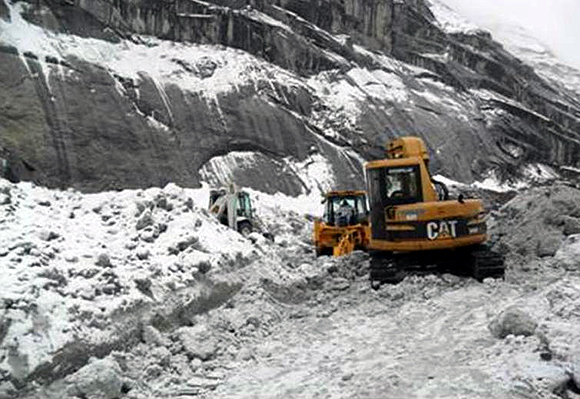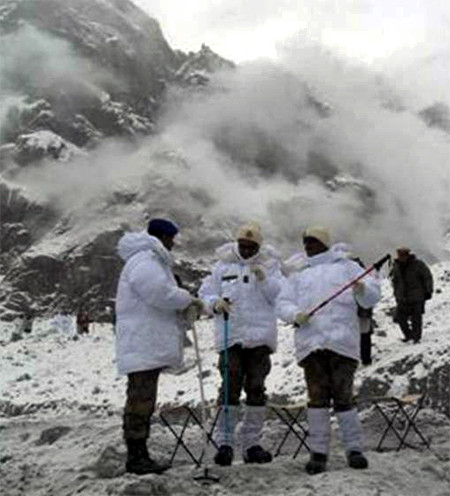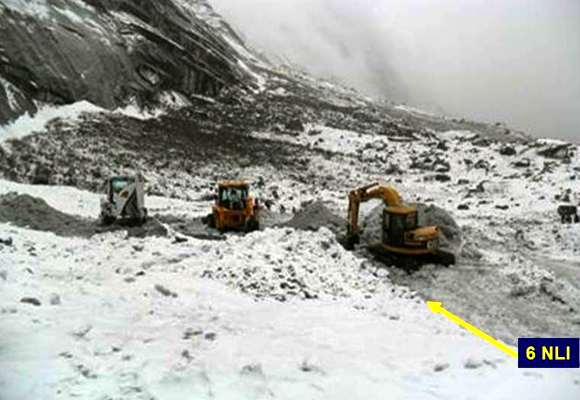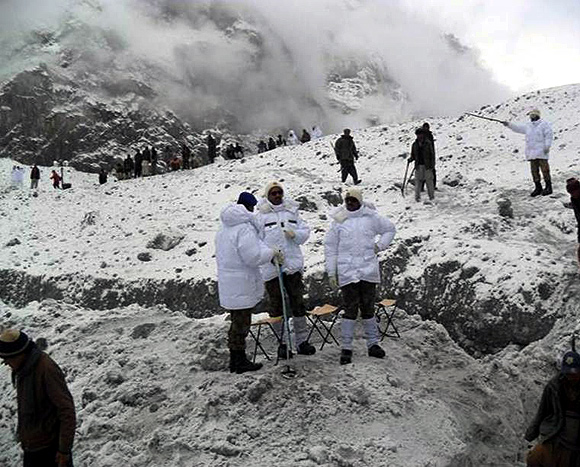 | « Back to article | Print this article |
Siachen conflict: 'A struggle of two bald men over a comb'
The issue of Siachen is not complicated like the issue of Kashmir; it could be resolved overnight but needs serious consideration, says Tahir Ali.
"If somebody wants to see hell on earth he should see Siachen," says a Pakistani soldier who has served his tenure in Siachen Glacier.
Siachen was in the news on April 7 when around 150 Pakistani soldiers and civilians were buried 20 feet deep under an indifferent glacier that has brought darkness into the lives of their families. Rescue attempts were foiled by the weather from the very start, which prevented rescuers from reaching the site. Bulldozers and excavators are being used to shift the ice but due to the harsh conditions progress is slow. Four days after the incident not one victim had been located, dead or alive and their chances of survival are very little now.
The Siachen Glacier is the longest glacier in the Karakoram and second-longest in the world's non-polar areas. 'Sia' in the Balti Language refers to the rose family plant, found in the region. 'Chun' references any object found in abundance, so in an ironic twist, Siachen refers to a land with an abundance of roses. In reality, Siachen, instead of roses, presents thorns to the soldiers, of both India and Pakistan.
Click NEXT to read further...
For Realtime news on the Siachen Glacier, click here
In Siachen the soldiers are dying for nothing
Siachen is equally dangerous for Hindustani and Pakistani security forces. According to an estimate each year 100 Pakistani soldiers and 200 Indian soldiers are killed by avalanches or inclement weather. Soilders are lost in battles, but it is for a cause. However, in Siachen the case is totally different; the security personnel of both the countries are dying for nothing.
Who could be held accountable for these killing? In a country like Pakistan where civilians and soldiers are being killed in drone attacks, activities of the Taliban or in street battles, in Siachen the weather shows its unpredictable temperament by burying the innocent soldiers.
There is a famous Pashtu saying, 'Ka day Buner ta talay na way mar ba na way' (If he did not visit Buner he would never die.). The question is, who hands these innocent soldiers over to the mercy of the harsh weather.
Click NEXT to read further...
'I dare not venture out to count stars in this part of the world'
Stephen P Cohen, a senior fellow at the Brookings Institution writes about the Siachen Glacier conflict, "It might be thought of as just another low-intensity border war -- were it not being fought between the world's two newest nuclear powers. Their combat over a barren, uninhabited nether world of questionable strategic value is a forbidding symbol of their lingering irreconcilability.
The Siachen conflict is like a struggle of two bald men over a comb."
Unfortunately, the miseries of these soldiers are highlighted when incidents like that of April 7 take place, but no one cares for the lives of the soldiers at the Siachen Glacier. Last week a Pakistani newspaper published an account of a soldier who had served his tenure at Siachen. The soldier narrates, "My room, call it my studio apartment, is a typical bunker, built on self-help basis, thanks to our meager resources.
Carved out from a hillock, it is a classical one-window room of 14 10 feet. The 10-foot high ceiling had 70 girders. Trivial information, you say? I count them every night before I can sleep. No, I have not grown insomniac, but I dare not venture out to count stars in this part of the world. On one side, the empty cartons have been arranged, covered by gunny bags; the other wall supports the bed (an arrangement of empty cartons) upon which lies an air mattress, along with our sleeping bags."
Click NEXT to read further...
The radio is the soldier's window to the world
"Tastefully, the big-flower-print bed sheet does not permit the attention to drift to the poor structure of the bed. The dark toilet is an extension of the same room. An old cough syrup bottle has been modified with kerosene oil to serve the purpose of the lamp which practically lights up nothing. The empty ghee cans are our makeshift geysers. Basic instinct is the best aide when it comes to anatomy in the dark bathroom.
The room decor is an artistic arrangement of the empty containers of food, fuel and fire. Food cartons serve as tables, fuel cans as stools and empty (fired) cartridges as bedside teapoy items. The most decorated table has boxes of chicken cubes, noodles, egg biscuits, brick-game and yes, our window to the world, the radio. Other inhabitants include a Fujika (a kerosene-lit heater), petromax, the books and the military phone -- this masterpiece of technology which connects me to you (his family), remains silent.
The weather, the snow, the wind, the electric power everything conspires against our probable communication. Reminds me how Shah Latif narrates the plight of Sassi after she had been robbed of Pannu: 'The camel (which carries Pannu) is my enemy, the wind (which is erasing the foot prints of caravan) is my enemy, the sand is my enemy and so are the brothers of Pannu. And most of all the sun is my enemy, for having risen so late and not waking me up."
Click NEXT to read further...
'Siachen is an ego problem between the two armies'
The issue of Siachen is unresolved since 1984; both the countries have lost numerous precious lives. The issue is not complicated like the issue of Kashmir; it could be resolved overnight but needs serious consideration. Even the United States is ready to support Pakistan and India in finding a resolution to the Siachen conflict, but it says that primarily the issue should be resolved by dialogue between the two countries.
"We have made clear to both India and Pakistan that we are prepared to be supportive in any way that might be helpful, but primarily we see this being settled by dialogue between (them)," said State Department spokesperson Victoria Nuland.
Pak-India peace activist Tahira Abdullah thinks that it is very simple to resolve the issue but both the countries have made it an ego problem. "This absolutely futile, useless fiasco has been going on since 1984. It is a one-hour job to agree on a solution, but it is now an ego problem between the two armies. Both armies should pull back from the heights. Soldiers are dying and my heart bleeds for them, but it's for nothing," said Tahira.
According to Imtiaz Alam, the head of the South Asian Free Media Association, "Why should we be going for an agreement? If we do that, Indian domestic pressure will also result in a withdrawal there. They will say it is madness to continue."
The recent visit of Asif Ali Zardari and his meeting with Indian premier Manmohan Singh has brought slight hope that both the countries would start talks to resolve their outstanding issues including the Siachen Glacier. Pakistan has lauded India's offer of assistance in rescue operation in Siachen by terming it as a 'good gesture'. But the critics are of the view that instead of collectively digging out the trapped soldiers both the countries should take serious steps to find out a permanent solution to the issues to avoid such incidents in the future.
In this regard the suggestion of civil society organisations is excellent who are calling upon Islamabad and New Delhi to set an example by converting the Siachen Glaciers into the first ever 'peace park' at a height of 22,000 feet.
